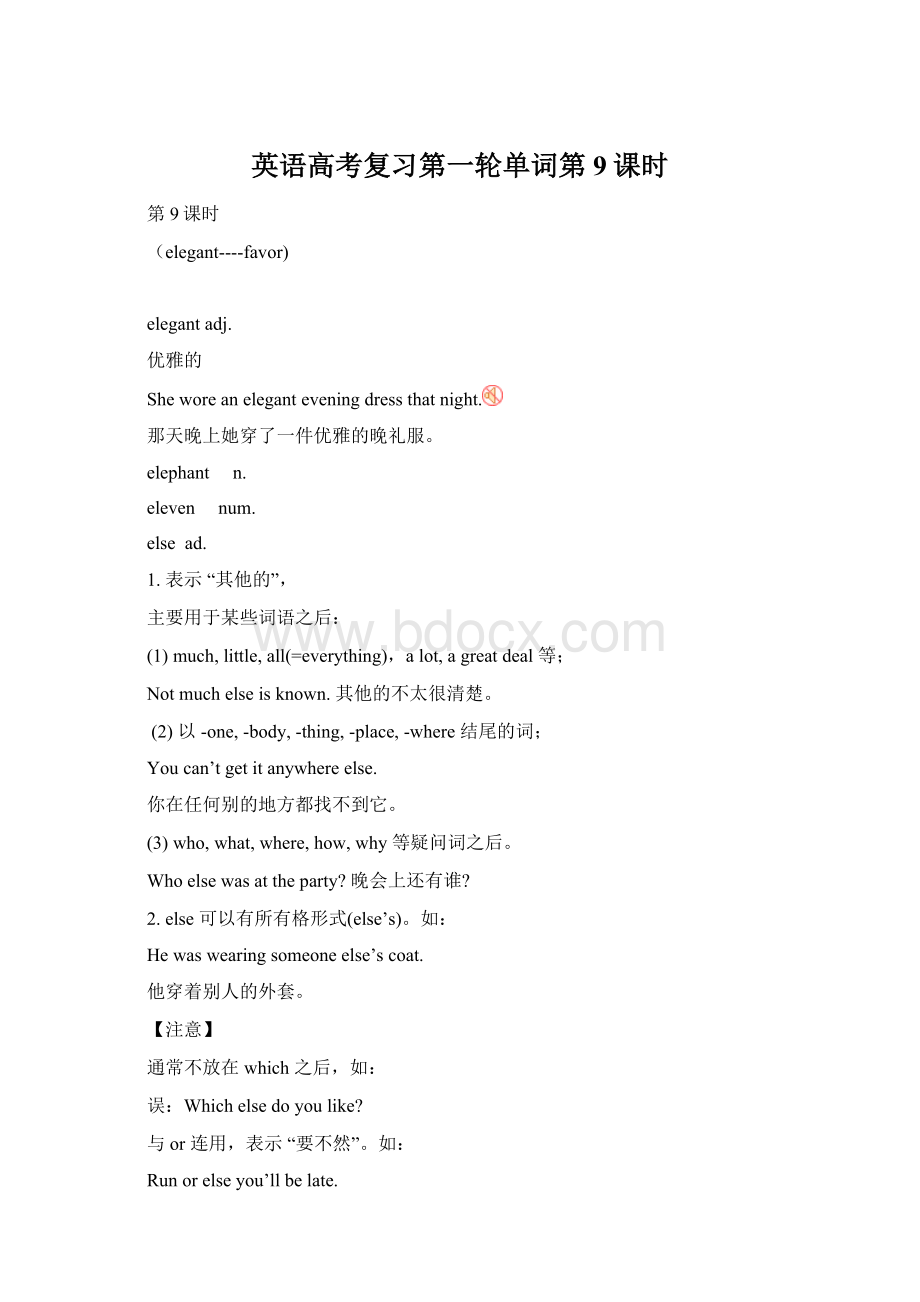英语高考复习第一轮单词第9课时Word文件下载.docx
《英语高考复习第一轮单词第9课时Word文件下载.docx》由会员分享,可在线阅读,更多相关《英语高考复习第一轮单词第9课时Word文件下载.docx(22页珍藏版)》请在冰豆网上搜索。

emergency[见上,-ency名词后缀]突然事件,突然出现的情况
immerge[im-入内]沉入,进入
im-in
submerge[sub-下]沉下
【emperor/empire】皇帝/帝国
employvt.
vt.1.雇用:
Thisfactoryemploysthousandsofpeople.
2.受雇:
eg:
Shewasemployedasaprogrammer.
3.[employoneself]
toemployoneselfinstudy专心学习
4.用
(时间、精力、东西,手段等):
toemployahammertodriveanail用钉锤敲钉子
toemployeverythinginone'
spower
千方百计
emptya.v.
vt.
1.腾空
2.使失去(of):
toemptyaboxofitscontents
将盒子里的东西全部腾空
encourage vt.
end n.v.
intheend
【endlessa.】
enemyn.
【energetica.】
energyn.
power,force,strength的区别
1.energy
A.指能源;
solarenergy太阳能
B.精力
Heisamanfullofenergyandhecandoasmuchworkasthreemendo.
2.strength指力气。
3.power权力
Thepowerofthekingisverygreat.皇帝的权力很大。
4.force武力,可以操控的势力。
如军队等。
▲engine n.
engineer n.
Englandn.
Englisha.n.
inEnglish
Englishmann.
【English-speakinga.】
enjoyvt.
enjoyoneself
【enjoyablea.】令人愉快的
【enlargevt.】
en-三层意思
1.“置于…中,”
encage关入笼子
encase装入箱子
encave藏入洞中
2.“致使…”
enlarge使扩大
endanger使遭危险
enable使能够
encourage使有勇气
3.加在动词之前,
表示“in”,或只做加强语气
enclose围入,关进
enormousa.
enoughn.a.ad.
【enquiryn.】询问
entervt.词组
1).enterfor
(报名)参加(竞赛、考试等):
toenterforanexamination
2)enterinto
1.参加:
Weenteredintothesportwithzest.我们热心参加这项运动。
2.考虑:
Wewillenterintothequestionofinheritedcharacteristicsatafuturetime.
我们将在以后讨论遗传特征问题。
【entertainmentn.】
entertainv.
entertainment=excitement
vt.1.使欢乐;
使有兴趣:
toentertainchildrenwithfunnystories
给孩子们讲有趣的故事
Ateachershouldentertainaswellasteach.
教师不仅要教书,也要引起学生兴趣。
2.招待(客):
entertainfriendsatdinner.
招待朋友吃饭
▲enthusiastica.热心的,热情的
entirea.entirely和completely
作程度副词讲时,没有区别
但是completely因为是从形容词complete转化来的,
它有"圆满"的意思在内。
eg:
Theworkhasbeendonecompletely.
工作圆满完成。
Theworkhasbeendoneentirely.
工作整个做完了。
entrancen.讲过
entrancetothetheatre
answertothequestion
keytothedoor
【entryn.】
n.进入
envelope n.信封
▲environment n
envy vt.&
n.词法
envy用法:
envysb.sth.
Note:
名词可以表示"受嫉妒的对象",如:
Heistheenvyofothers.
equala.vt.beequalto形容词的搭配
短语
1.betheequalofone'
sword
说到做到
2.bewithoutequal
无比
【equalityn.】同等,等式
【equipvt.】~sb/sth(withsth)装备
equipment n.无复数
apieceof
▲errorn.
mistake,fault,shortcoming的区别
均表"
缺点"
,"
错误"
.
mistake:
You'
vemadeseveralgrammaticalmistakesinthecomposition.
你的作文中犯了几处语法错误。
1.fault表示"
过失"
,可与error通用,现多用来指缺点,特
指缺乏某要素因而不完美。
Thereisafaultinthismachine.(这台机器有一处毛病。
)构成短语
findfaultwith
挑剔
2.shortcoming
可指人或事物的本质上不足之处
(常用复数)。
Inspiteofhisshortcomings,Istilllikehim.
(尽管他缺点多,我仍然喜欢他。
)
escapen.&
vi.flee的区别
1.表示“逃走”或“逃脱”
不与away,off等副词连用
误:
Thethiefhasescapedaway.
正:
Thethiefhasescaped.
2.下列情况,其后可接介词from:
(1)从具体的某一场所逃走。
Theyescapedfromtheburninghouse(prison)。
3.下列用法,通常是及物动词:
(1)表示被遗忘或未被注意等。
Nothingescapedhisattention.
任何东西逃不过他的注意。
catchone’seyes/attention
(2)表示逃避不愉快的事:
Hetriedtoescapepunishment.
3.escape和flee的区别
两者均有“逃”的意思,但有区别:
1.escape
从被监禁或类似没有自由的状态中逃脱。
2.flee表示“逃走”,
强调逃走时的急促或仓促。
Theburglarswerefrightenedandfled.夜盗们受惊逃走了。
注:
表示“逃跑”时,
escape是不及物动词,
而flee则可用作及物或不及物动词。
Hefled(from)theburninghouse.
especiallyad.
specially,particularly的区别
1.especially:
反义词为ordinary
2.specially:
其反义词为general
3.particularly:
常与especially换用,但更强调“与众不同”。
especially,specially,particularly
用法辨异
一、强调程度时
三者都可用。
Itisparticularly[especially,specially]coldtoday.
今天特别冷。
二、当强调目的时,通常用specially或especially:
Weboughtitspecially[especially]foryou.这是我们特意为你买的。
三、表示列举时
列举一个具有代表性的例子作进一步强调时,一般用especially,有时也用particularly,其后可接名词、介词短语、从句等。
Wewanttoinvitesomefriends,especiallyJimandJohn.
▲essay n.散文,评论
Europen.
Europeana.n.
eve
even ad. yet,still的区别
1."
even"
有"甚至于"的味道
ShenotonlyacceptsJam'
sbadhabit,sheevenwantstolivewithhim.
2."
still"
暗示“尽管有很多反对意见”,但...
ItoldhernottolivewithJam,butshestillwantedto.
3."
yet"
一般放在句子最后,表示某个动作还没有完成
Shehasn'
tlivewithJamyet.
yet=but:
Sheisfoolish,andyetpeoplelikeher.
evenif/though
eveningn.
event n.
affair,matter,thing,business的区别
1.event指具有重要性的大事
2.affair
a)publicorpoliticaleventsandactivities
worldaffairs
b)thingsconnectedwithyourpersonallife,yourfinancialsituationetc
eg:
Iamnotpreparedtodiscussmyfinancialaffairswiththepress.
另外,affair还可指男女间的私情
4.matter指“事情,问题”
asubjectorsituationthatyouhavetothinkaboutordealwith
需要讨论/处理
5.business
主要指(需要处理或讨论的)
重要事情
6.thing
既表示抽象概念,又可指具体的行为、做法、困难等
举例汇总:
eg.themaineventof2006
2006年的主要大事
eg.theWateraffair水门事件
表示“公共事务;
政治事务;
个人的事”
eg.worldaffairs世界事务
eg.privatematter私事
eg.adifficultthingtodo难做的事
eg.themainbusinessofthemeeting
会议的主要议题
business,affair,thing还可与形容词连用,
e.g.Ifoundthewholebusiness/affair/thingverypleasing.
考点例题:
①Shenevertalksaboutprivate________withherfellowworkers.
②That_______ledtothefailureofthegovernment.
④Thecarcrashwasaterrible___________.
⑤Ifthere’snoother_________,wecanendthemeeting.
⑥Youshouldbeabletomanageyourown________.
Answers:
1matters②event
④affair/business/thing⑤business
⑥affairs
eventuallyad.=finally
everad.
eversince
forever
everya.
everybody/everyonepron.
▲everydaya.
everythingpron.
everywheread.
=anywhere状语从句的引导词
▲evidence n.witness比较
1.evidence普通用词,
在法律上指能起证明作用的,如证明、公证书以及所有的实物东西等。
在生活中指任何一样可证明某一件事的真实性的东西。
2.witness指证据或证人,尤指后者,且有亲眼见到之意。
exact a.
examination/examn.
examine vt.check的区别讲过
1.examinesb(in/onsth)考,测验(某人)
examine
侧重看人或事物是否存在问题(毛病)
也有“询;
对…进行考试”之意。
Alltheluggageistobeexaminedwhenyouenterthecustoms.
进入海关时所有的行李都要检查。
2.check
检查;
检验
check
侧重看前后数量等是否一致,
也常用于判断事物的正误、有无或是否正常等。
You'
dbettercheckyouranswersbeforeyouhandinyourpaper.
example n.
forexample,suchas,take…for
excellent a.
exceptprep.
exceptfor,besides,but的区别apartfrom
一、except的用法--"
排除式"
后跟的部分不包括在整体之内。
因此,常和all,everything,noone,nothing等词一起使用。
其判别标志是:
除去的与保留的是"
同类项"
。
例如:
Allofthemwentoutforawalk________John.
A.besidesB.except
C.besideD.excepts
二、exceptfor/that的用法--"
排除否定式"
(1)exceptfor...
"
先做一个整体评价,然后再就局部提出一点看法"
1.Itwasdarkinthecity________afewweaklights.
A.exceptforB.except
C.besidesD.butfor
(2)exceptthat...也是"
除去……一点外"
的意思
1.Thesuitfittedhimwell________thecolourwasalittlebrighter.
A.exceptforB.exceptthat
C.exceptwhenD.besides
2.-Canyoutellmeallabouttheearthquake?
-Sorry,Iknownothingaboutit________Ireadinthenewspaper.
A.exceptB.exceptfor
C.exceptwhatD.exceptthat
3.MrGreenusuallygoestoworkbybus________itrains.
A.besidesB.exceptwhen
C.exceptwhatD.beside
三、besides的用法--"
包括式"
besides相当于aswellas,
besides后面的部分包括在整体之内。
1.DoesJohnknowanyotherforeignlanguage________French.
A.exceptB.but
C.besidesD.beside
四、but的用法--"
相当于except
(1)例如:
1.Theyallwenttothepark________Mikeandme.
A.besidesB.exceptfor
C.butD.beside
(2)but常与下列词连用:
a.否定词noone,none,nothing等;
b.疑问词who,what等;
c.不定代词all,everyone等。
1.Nothingbutdisasterwouldcomefromsuchaplan.
这个计划只能招灾惹祸,别无益处。
2.WhobutTomwoulddosuchathing?
除了汤姆以外还有谁愿意干这种事?
(3)but后可接动词不定式。
注意:
当but前面有实义动词do以及其相应形式作谓语动词时,则其后跟不带"
to"
的动词不定式,反之加"
1.Davidcoulddonothingbut________histeacheryesterdayafternoon.
A.helpB.helped
C.helpingD.tohelp
2.Theenemyhadnochoicebut________theirarmsand________.
A.liedown;
givein
B.laydown;
C.tolaydown;
D.toliedown;
togivein
butfor是"
要不是"
的意思,常用于虚拟语气。
Butforyourhelp,Iwouldhavefailed.
要是没有你的帮助,我早就失败了。
3)apartfrom表示“除…之外”。
根据上、下文的不同,
它既可用作besides,也可用作except和exceptfor。
▲exchangen.change
change
"改变","找回的零钱"
n./vt.
Letmechangethedollarbillforcoins.
让我把这张一元的纸钞换成硬币。
exchange
交换[(+for/with)]
We'
llhaveanopportunitytoexchangeviewstomorrow.
明天我们将有机会交换看法。
1.I'
dliketoexchangesomepoundsfordollars.
我想把一些英镑兑换成美金。
excitevt.
excitinga.
excusen.vt.
n.理由;
借口
exercisen.vi.主要讲名词搭配
n.运动;
练习;
操练
1.bring…intoexercise
(充分)运用
2.takeexercise
做健身活动
exhibition n.展览会
exhibitv.=onshow\display\exhibit
existvi.
▲existencen.注意拼写!
▲exitn.
expect:
强调心理的期待,不发出动作
wait:
强调动作
vt.
1.预期:
Hunterexpectsthatshewillcome